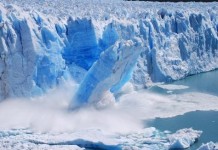
Science fiction in literature and movies has a long history and dates way back.
The great Polish writer Stanisław Lem (1921-2006) wrote the 1961
sci-fi novel ”Solaris” that was later turned into a film in 1972 by
Russian director Andrei Tarkovsky and again in 2002 in a new Hollywood
remake by Steven Soderbergh, starring George Clooney.
And from “Soylent Green” in 1973 to “The Day After Tomorrow” in 2004,
movies also began to venture into a new genre of science fiction that
might be called “cli-fi” (for climate fiction).
Cli-fi is also a new genre for novels and short stories, and one of
the new practitioners is American writer Jim Laughter, who has peered
into our climate future — and guess what, he’s not laughing.
In a new novel, to be released as an ebook and paperback, the retired
grandfather of four envisions so-called ”polar cities” for future
survivors of devastating climate change disasters worldwide.
No less an authority than British scientist James Lovelock has heard
about Laughter’s polar cities theme, and in an email to this reporter,
Lovelock said: “Thanks for telling me about these polar city themes.
It may very well happen, and soon!”
Does this have any connection to today’s world? Well, in the distant
future — some say the near future — North America, northern Asia and
Europe will see millions of climate refugees from southern lands
trekking northward, and the entire Lower 48 might be under threat
from the devastating impacts of ”climate chaos” — from rising sea
levels to a scary scarcity of food, fuel and shelter.
Enter “Polar City Red,” Laughter’s cli-fi novel set in an imagined
Alaska in the year 2080. But it could just as well be Tokyo or Oslo or
Berlin, too. Global warming is borderless, and so are our fears.
Forget NASA’s missions to Mars, says Laughter, and start thinking
about mass migrations of ”climate refugees” north to Alaska. (By the
way, the term “climate refugees” was coined by Robin Bronen, a woman
professor in Anchorage.)
Laughter, a 20-year veteran of the U.S. Air Force who was stationed in
the UK and Japan and the Philippines, among other places, is worried.
“You know, I met a man just the other day who told me, who insisted,
that global warming is just a myth,” Laughter, author of ten sci-fi
novels and a resident of Oklahoma, told this reporter. “He saw a
program on television that said it’s a scare tactic to direct people’s
attention away from truly serious issues such as the economy and the
state of international affairs. He’s right about one thing; it’s a
scary subject. And if projections are correct about the amount of
carbon dioxide polluting our atmosphere, we’d better be scared. We may
not be at the point of panic yet, but the day is coming when this is
world is going to turn its back on us and invite us to leave forever.”
“So I’ve put my heart into this new book,” Laughter added. “It’s for
my four grandkids. I hope it helps to wake the world up, too!”
“Polar City Red” is a not book written by a scientist, ”since I am no
scientist,” Laughter is quick to add. “But I am approaching the story
as a family man concerned about the future of our planet. If my sci-fi
story can reach a small audience at first and later reach an even
greater readership worldwide in translation, I’ll be happy.”
Laughter says ”Polar City Red” is just a good old-fashioned yarn for
the average lay person, but adds: “I’m sure scientists many times
smarter than I am will read the book and say, ‘I could have said that
better.’ But I hope climate researchers will also enjoy the book,
without being too critical. Hollywood screenwriters might want to take
a peek, too. It’s the day after ‘The Day After Tomorrow’ but based on
global warming rather than global cooling. I think a visionary film
director could have a field day with this.”
Laughter says that as a fiction writer he is straddling the fence. “I
hope the message I’m trying to convey isn’t overshadowed by criticism
and skepticism from climate denialists and skeptics,” Laughter says.
“You never know when a scientist or activist studying global warming
might read something in the book and realize their life hasn’t been
wasted trying to warn humankind of our folly when we burn billions of
tons of fossil fuels every year and expend dangerous levels of carbon
dioxide into the atmosphere. Global warming is no laughing matter.”
Or so says Jim Laughter.
“I’m not smart enough to scientifically explain the intricacies of
global warming,” Laughter adds. “But neither am I stupid enough to
ignore the signs around me. I’ve driven through a few stop signs and
traffic lights in my life, only to be stopped by policemen alert to
the situation. The human race had better start paying attention to the
signs around us if we want to leave a habitable planet for generations
to come.”
Sci-fi and cli-fi fans will likely be the first and most avid readers
of “Polar City Red” since it’s set in a “Mad Max” kind of climate
dystopia just outside Fairbanks in the not so distant future. One
might think of it as a marriage between Mel Gibson’s “Mad Max”
franchise and Cormac McCarthy’s Pulitzer Prize-winning novel “The
Road.”
Is it science? No, but it doesn’t take a rocket scientist to
understand that climate chaos is going to have a direct – and chilling
— impact on the entire planet, and especially on the Lower 48 and our
49th state, Alaska.
For now, Laughter’s book is just an old-fashioned cli-fi yarn, so
there’s nothing to be afraid of.
Still, it’s “Soylent Green” food for thought for the day after “The
Day After Tomorrow.”
Related



































I sure hope he doesn’t publish his book with such a horrible font and formatting as the above post.
John said: “I sure hope he doesn’t publish his book with such a horrible font and formatting as the above post.”
Don’t worry, POLAR CITY RED will be published in picture perfect format. — dan
Publisher is in Texas, author lives in Oklahoma, His book is poised to go global
since the story he writes is really the stuff of the daily headlines we see today:
rising sea levels, Lower 48 dry spells, climate change, global warming, rush to polar
exploration, James Lovelock, Gaia, survivalism, dystopia, Alaska, things like that. But Jim’s book is just fiction, so no need to get alarmed.
The font and formatting are because the post was sent to me by Gmail. Gmail does terrible things at times. Unfortunately, I don’t have the time to re-type or re-format Gmail posts. Editing a post like this can take up to half an hour, and sometimes, for reasons I don’t understand, I can edit the post and then WordPress will still publish it in the original, terrible, Gmail form. It completely ignores all the edits and will only publish the orignal text. Very odd.
The other thing I don’t understand is that most of the time when I edit a Gmail post, either in WordPress or in my blod editor, MarsEdit, the post will look fine in the editor and I think I’ve gotten it right. When it’s posted, however, the post keeps the original formatting and I’m as surprised as you are that it displays the way it does. I hate Gmail submissions 🙁
And one more thing, John, and readers here, to clarify: this is all my fault, not Paul’s.
I type very poorly and when i put things on my email machine the line separations
are always uneven and i sent my email this way to Teleread so it came this way in the mail and Paul does not haev time to fix my line gaffes, but this is ALL my fault and I apologize. my typing and spacing is horrendous. OLD MAN GETTING OLDER every day. SMILE. and all tyupos are mine too.
“I hate Gmail submissions”
To overcome these kinds of formatting issues, I always copy/paste from source into a completely basic, non formatted app like ‘writer’ or ‘textedit’ on the Mac, and immediately copy/paste it out of that into the intended target system. That strips out all of the Gmail formatting sh1t.
Just my two cents.
“Cli-fi”
What a stupid stupid concept.
Howard: I’ll try it. Thanks!
@Howard, re ”CLI FI, what a stupid stupid concept”, above:
The nice thing about life and the internet is that all points of view are
allowed, and everyone has their own likes and dislikes. People didn’t like
sci fi as a term when it first appeared, and you didn’t like cli fi when you
first saw it. That’s okay. But you should know that master sci fi writer from
Canada, Margaret Atwood, likes the term CLI FI and tweeted about it a few weeks ago. So all points of view and likes and dislikes make this world a very interesting
and multi-POV place. Thanks for reminding me. SMILE.
— danny
PS: Howard, you will get used to CLI FI as time goes on, it’s a term that has been
around for a few years ago and has gone viral online now. GOOGLE it. It merely means climate fiction, that is to say novels about possible future climate change scenaries, such as “The Day After Tomorrow” and “The Road”. It’s like sci fi but it’s more focused on climate issues, pro and con, so even ”climate denialists” like you, Howard, can like it, You seem like the kind of man who shoots first and asks questions, later. Maybe not such a good M.O……
Still completely stupid and has no chance of catching on except among a small climate nutter clique.
Well said, Howard. Your “nutter” comment seals the deal. You really are in denial, you probably think Jesus rose to Heaven and the earth is flat. Nice to meet you, fellow nutter! I love people like you! really. laughter is the best medicine.
And Howard, the term CLI FI, coined by someone else 8 years ago or so, is not the important thing here. Take or leave it. What is important is climate change is slowly sealing shut the future of the human species. If it goes on unchecked, there won’t be books to read or websites to screen in the future. Our descendants will not continue to descend after a certain point IF we don’t take collective global action on climate issues soon. Head in the sand won’t get you anywhere, except it does fulfull a psychological need of denialists to hate and denounce anyone left of center of Marc Morano or Rush Limbaugh, not to mention Anthony Watts. I realize that is the kind of world you want, and you might get your wish. Meanwhile, let’s be friends. Have we met before here? — Dan
I have to admit that that the term “Cli-Fi” seems rather silly and unnecessary to me. On the other hand, people can make up whatever terms they want. It’s harmless and it will either enter general use or it won’t.
Climate change is science. So any future projection of climate change falls easily under the existing Science Fiction label.
Ignorant people, however, tend to think that the term “Science Fiction” means “made up weird stuff” rather than fiction based on projections of current science into the future. My guess is that the “Cli-Fi” proponents are hoping to seem more serious and don’t want to be tarred with the baggage that comes with the “Sci-Fi” label.
Binko, that was a very reasoned comment, above, well said. A book is a book is a book, what genre it gets filed in is unimportant, i agree with you. Cli fi sounds like a trendy term, but trendy terms don’t last. Sci fi had trouble taking hold but it finally did and it’s a respected genre now. You are so right: sci fi does not mean made up weird stuff. It’s just projections based on science things. In the end, what we need is hard science on climate issues, and we still don’t have all the facts in yet. As some say, we might be headed toward global cooling. THE DAY AFTER TOMORROW was certainly about that, and these past few winters have been real cold, too. So who knows. In the end, I think Jim’s book POLAR CITY RED is just entertainment, sci fi, speculative fiction, just a good read on the airplane. And on yr iPad etc.
Sorry, my original comment was supposed to be sarcastic only, not an insult to the topic, book, or author. If it came across as an insult, I am sorry. I was only poking fun at the courier font with hard wrapped lines 🙂
In terms of “cli-fi” as a genre, there will occasionally be the odd typo, which will put a whole new spin on the subject matter…. 🙂
In terms of a good novel of “cli-fi”, I would highly recommend Linda Mooney’s “A Different Yesterday” about surviving after the Sun blows up. Here is a link:
http://www.goodreads.com/book/show/10027879-a-different-yesterday
Mmmmmm so let’s see …. anything in SF where the sun is different is Cli-fi …. I guess then that anything with more than one sun must be is Cli-fi …. and anything with no sun must also be is Cli-fi. Anything where the weather is different must be is Cli-fi …. and anything where the temperature is different must also be is Cli-fi. Anything with multiple planets with different weather, a different sun, different temperatures, etc etc etc etc must also be is Cli-fi.
What a joke.
(John – I copy/pasted to avoid those pesky typos…LOL)
John, your comment above re: “In terms of “cli-fi” as a genre, there will occasionally be the odd typo, which will put a whole new spin on the subject matter…. ”
LOVE IT. the nice thing about the Internet is all these minds joined in together and things appear as if out of nowhere. Your Cli Fi pun re what might happen when a typo occurs one day in the future a la clit-fi (sic) is telling, funny and true. Humour helps in these matters, pro and con. Thanks for a good chuckle and thanks for heads up on Linda Mooney’s book.
Which brings up another minor point: do people’s last names have anything to do with the work or jobs they later go into, in terms of Mrs Mooney choosing to be a writer of sci fi about suns and moons and stars? It is a very fitting and apt aptonym. I know a writer in London named Peter Apps, writes for Reuters, and yes, his real last name and he writes about social media and apps. Google him.
”Jim Laughter (1953 – ) is an American writer living near Tulsa, Oklahoma. He is a retired U.S. Air Force Master Sergeant who spent thirteen years of his career at overseas duty stations, including the Philippines, Japan, and England. Jim has been married to his high school sweetheart, Wilma Boling, since 1971. They’ve traveled the world together and have raised three wonderful sons. Their four grandchildren keep them young.
Jim’s genre includes young adult fiction, true crime, murder thriller, and children’s books. Watch for Jim’s new book, ”Polar City Red”, set to release in paperback, Kindle, and Nook in the spring of 2012. ”Polar City Red” is an amazing human story set in the great northern tundra in the year 2075 after the Earth’s ecosystem suffers cataclysmic failure due to the effects of global warming. Can humanity survive his own worse enemy, himself?”